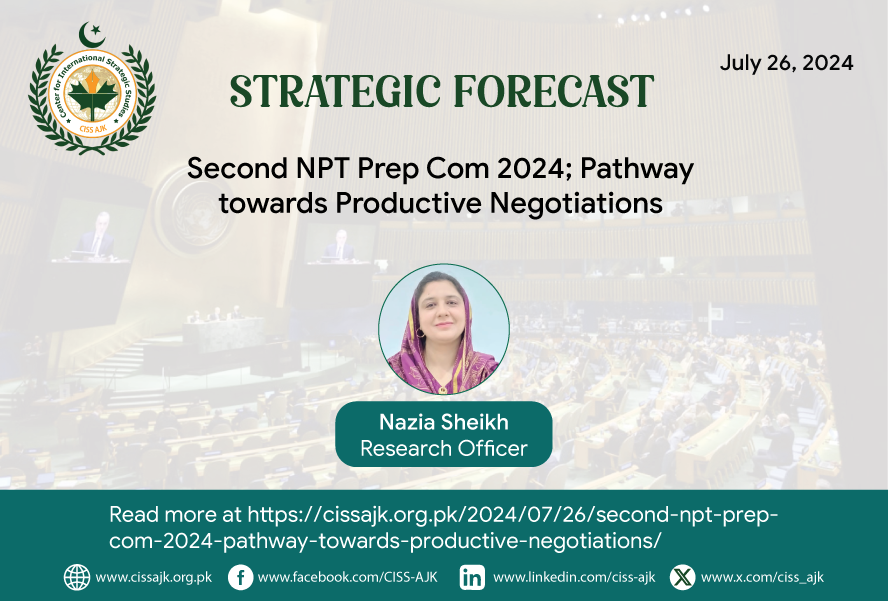The pressure on States parties to advance the treaty’s implementation is growing as diplomats gather in Geneva for the 2024 Non-Proliferation Treaty (NPT) Preparatory Committee (Prep Com). A more successful outcome is much needed, since States parties have been unable to develop a consensus document in the last two NPT review cycles. To get there, the NPT community will need to rethink the review procedure to make room for fresh perspectives and more productive avenues for advancement.
Challenges to NPT
The NPT regime is facing more and more challenges: as there are still more than 12,000 nuclear weapons in the world, many of which are ready to be deployed in just a couple of minutes, more than 50 years after the Treaty on the Non-Proliferation of Nuclear Weapons (NPT) entered into effect and also the third year of Russia’s war in Ukraine, all nuclear-weapon states (NWS, also known as P5) are moving closer to nuclear modernization, defense budgets are on the rise, and a growing number of NWS and their allies increasingly view nuclear weapons as the best means of ensuring national security.
Two sessions are scheduled to be held before the 2026 Review Conference, with this one being the second. Before the 2026 NPT Review Conference, states parties to the Nuclear Nonproliferation Treaty (NPT) are preparing for a challenging second preparatory committee meeting amid ongoing high tensions among key nuclear-armed nations. The historic 1968 treaty’s three main components—nonproliferation, disarmament, and peaceful uses of nuclear energy—will be reviewed by the 191 governments parties to the NPT during their meeting in Geneva on July 22–23, 2024. They also aim to create a forward-looking action plan for these areas.
Impact of previous review conferences
Previously the review conferences, which serve as the primary means of evaluating treaty performance and encouraging states-parties to fulfill their NPT-related duties, the preparatory meetings concentrate on formulating suggestions and furthering substantive debate on important issues. Political pressure is intense to guarantee a good outcome at the 2026 conference following the two previous review conferences’ failures to adopt significant outcome documents by consensus, in 2015 and 2022.
On the other hand, disagreements amongst a few NPT members have grown stronger and have been evident in numerous multilateral nuclear conferences, including the International Conference on Nuclear Security held last month and the first preparatory committee meeting in 2023.
Issues to address in preparatory committee meeting 2024
As each country steps up efforts to bolster its nuclear arsenal, analysts and diplomats anticipate that the preparatory committee meeting will address several issues, including the lack of communication between China the US, and Russia regarding arms control and nuclear risk reduction. To stop the arms race and achieve disarmament, state parties are required by Article VI of the NPT to negotiate in good faith. To negotiate a replacement for the New Strategic Arms Reduction Treaty (New START), which expires in 2026, the United States has offered Russia a proposal that Russia has rejected. US efforts for more negotiations on nuclear risk reduction have been rejected by China. According to the Stockholm International Peace Research Institute’s (SIPRI) yearly assessment for 2024, India’s currently has more nuclear weapons than Pakistan. The strategic stability of South Asia and the precarious balance of power in the area are at risk due to the modernization of the Indian military.
According to a representative of the United States for nonproliferation, Adam Scheinman, maintaining the legitimacy and integrity of the NPT is the Biden administration’s “top priority” at the preparatory committee meeting. Improving deterrence is intended to put the US in a strong position to seek nuclear arms limitation, according to Biden. The present administration makes it clear that it sees arms control as a tool to constrain the capabilities of its adversaries, China and Russia, rather than as a way to defeat nuclear deterrence. This way, the US can use its military might to gain the upper hand in the geopolitical great power competition. As long as Russia complies with the New START treaty’s limitations, the Biden administration will do the same.
Nuclear safety and the security risks posed by Russia’s ongoing takeover of the Zaporizhzhia Nuclear Power Plant in Ukraine are potential major themes of discussion at the preparatory committee meeting. Russia’s objection to language about Ukraine’s sovereign control over that plant in the draft document of the 10th NPT Review Conference was the reason Moscow blocked the agreement on a final conference document in 2022. There will probably be disagreements over the nuclear sharing agreements between the US and its NATO allies, Russia’s recent battlefield nuclear weapons drills, and the country’s forward placement of some of its nonstrategic nuclear weapons in Belarus.
Before the second preparatory committee meeting, Akan Rakhmetullin, the deputy foreign minister of Kazakhstan and the meeting’s chair-designate for 2024, conferred with state parties, experts in the field, and civil society organizations to address these and other divisions.
Cooperation amongst all NPT parties is necessary to guarantee agreement at the review conference in 2026. Nuclear-weapon states must set the example for all other nations to follow. The nuclear-armed members of the NPT, in particular, need to move more quickly to carry out their obligations to disarmament. In addition, the political will of the participants, as well as their cooperation and willingness to compromise, will determine the success of the preparatory committee meeting. The review cycle has been mired in impasse for far too long; the next two weeks in Geneva will be crucial in beginning to break it.
Author: Nazia Sheikh
Email: Nsheikh536@gmail.com
Bio: Nazia Sheikh is a Research Officer at Centre for International Strategic Studies, AJK. She is an MPhil scholar in international relations from international Islamic university Islamabad.

